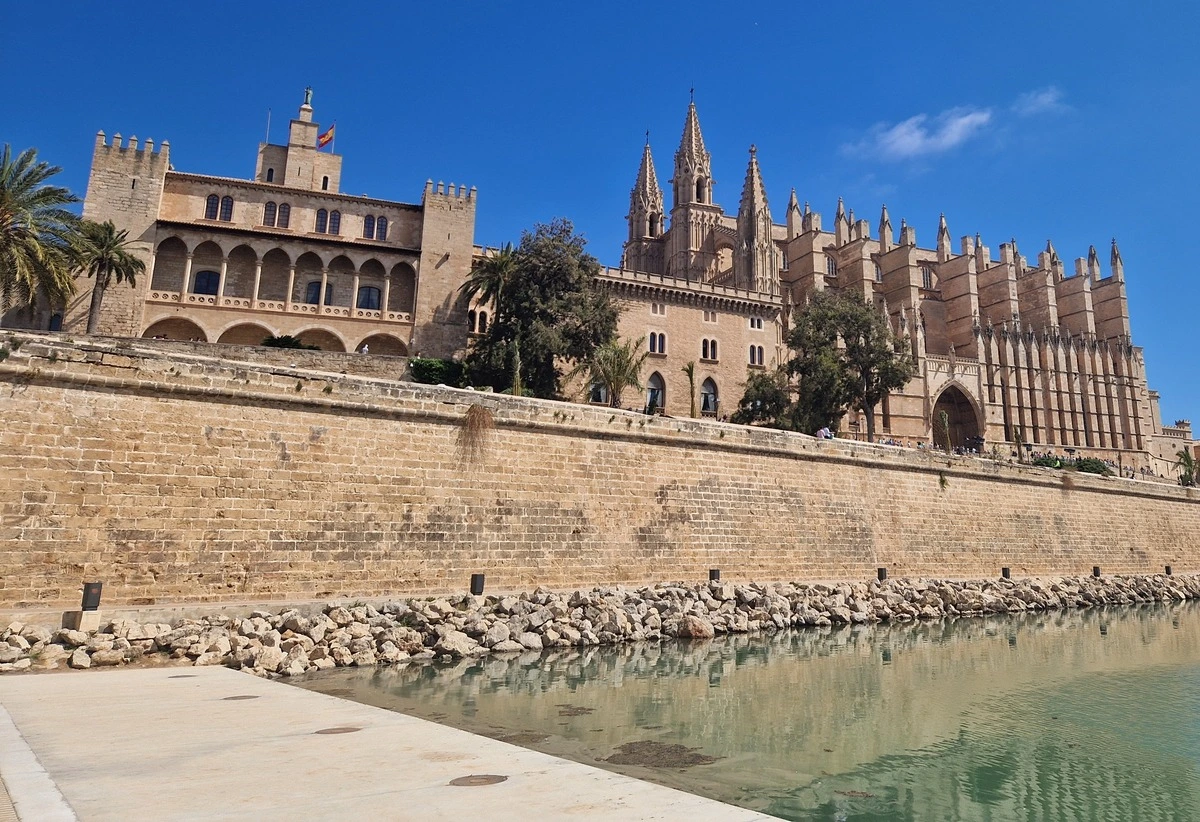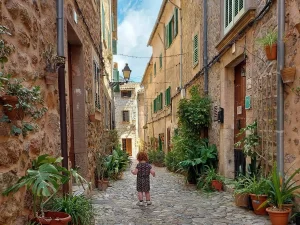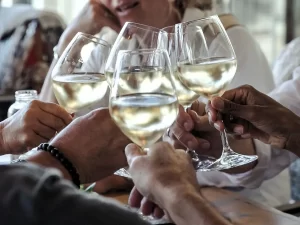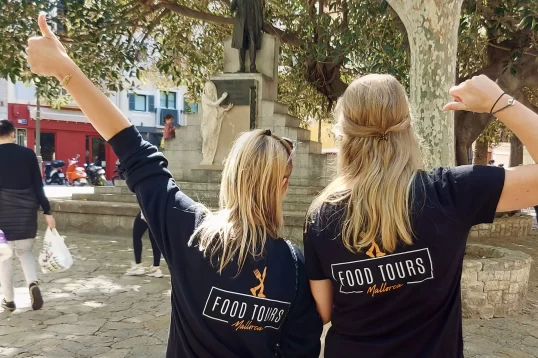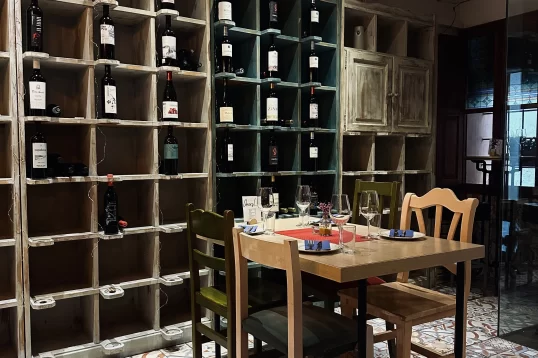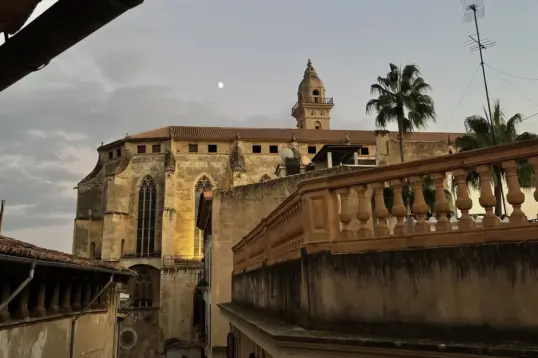Easter in Mallorca is a truly unique experience, where Mallorcan traditions come to life in a spectacular blend of faith, culture, and gastronomy. Semana Santa in Mallorca (Holy Week) is a time of solemn Easter processions, vibrant local customs, and delicious seasonal delicacies. Whether you’re witnessing an Easter parade in Palma de Mallorca or indulging in traditional dishes, this is a time of year that showcases the island’s deep-rooted heritage.
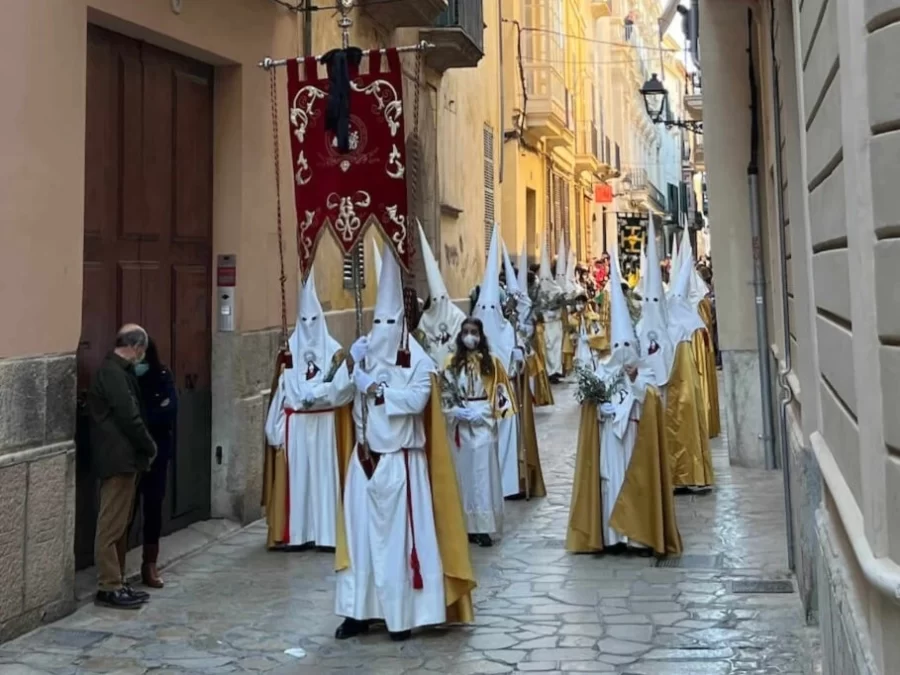
photo by Yes! Mallorca Property
The importance of Semana Santa in Mallorca
Semana Santa, or Holy Week, is one of the most significant events in Mallorcan traditions. It begins on Palm Sunday and continues until Easter Sunday, marking the Passion, Death, and Resurrection of Jesus Christ. Towns and cities across the island host solemn yet captivating Easter processions, where religious brotherhoods parade through the streets carrying beautifully adorned religious statues, candles, and banners.
These processions are a striking visual display of devotion, with participants often dressed in traditional robes and hoods, creating an atmosphere that is both dramatic and deeply moving.
Must-see Easter parades in Palma de Mallorca
Palma de Mallorca is the heart of Semana Santa celebrations, with its ancient streets providing the perfect backdrop for these spiritual gatherings. If you are visiting during Easter in Mallorca, these processions are an absolute must-see.
Procession of the Blood (Crist de la Sang)
One of the most important processions during Semana Santa in Mallorca is the Procession of the Blood on Maundy Thursday. Dating back to the 16th century, this deeply symbolic event sees thousands of cofradías (brotherhood members) walking through the historic streets, some barefoot, carrying religious statues and crosses. The atmosphere is both solemn and awe-inspiring, making it one of the highlights of Easter traditions in Mallorca
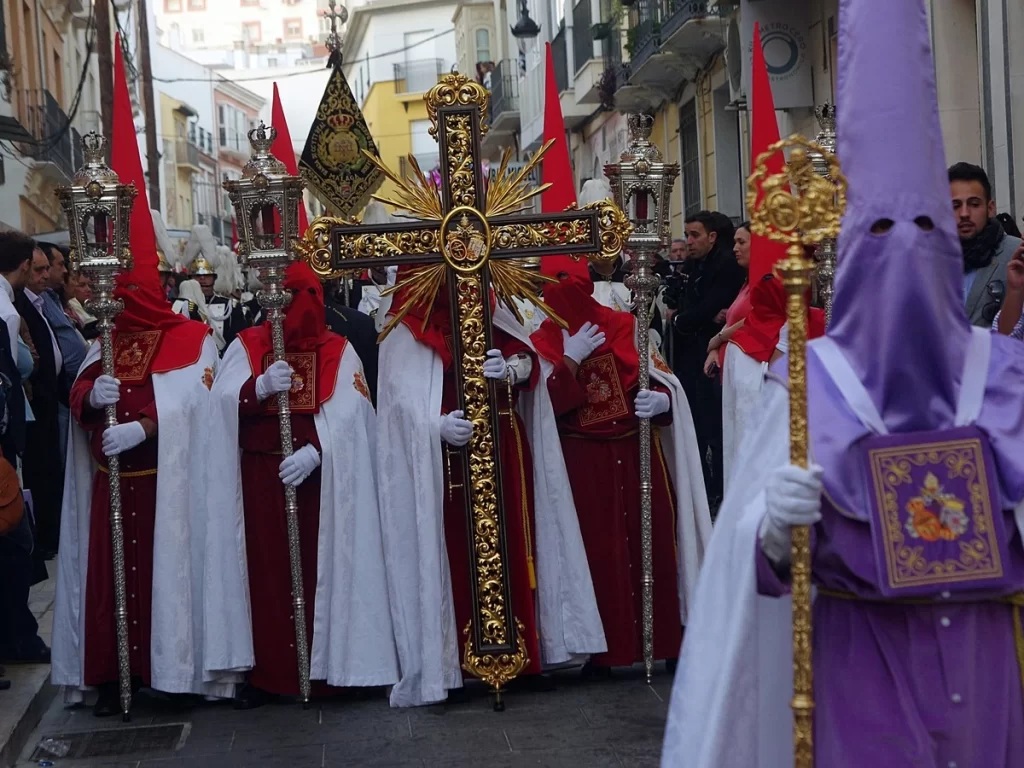
photo by Sangra
Other key processions
- Palm Sunday (Domingo de Ramos): The start of Semana Santa in Mallorca, where locals carry palm fronds to commemorate Jesus’ entry into Jerusalem.
- Good Friday (Viernes Santo): A sombre yet beautiful procession marking the crucifixion of Christ, often featuring hooded penitents walking in silence.
- Easter Sunday (Domingo de Resurrección): The most joyful celebration, symbolising Christ’s resurrection and featuring vibrant parades filled with music and colour.
Traditional Mallorcan Easter food
No Easter in Mallorca is complete without sampling the island’s delicious traditional dishes. Semana Santa brings families together, not just for religious celebrations but also for festive meals featuring time-honoured recipes. From sweet pastries enjoyed during family gatherings to savoury treats prepared in advance for Easter Sunday, Mallorcan cuisine plays a vital role in the Easter experience.
Sweet Easter specialities
Crespells – A fun family tradition
Crespells are simple yet delicious Easter biscuits, traditionally made with flour, sugar, butter, and a hint of citrus zest. They are often cut into fun shapes like stars, hearts, and flowers, making them especially popular among children. The tradition of baking Crespells dates back to the 17th century when nuns in convents prepared them during Lent. Today, families gather in the kitchen to bake these biscuits together, passing down recipes from one generation to the next.
Robiols – The perfect Easter treat
Robiols are half-moon-shaped pastries filled with a variety of sweet fillings such as fig jam, pumpkin preserve, cottage cheese, or chocolate. These delicate pastries are made with a thin, buttery dough that crumbles beautifully with each bite. They are typically eaten throughout Holy Week, often paired with a cup of coffee or tea.
Savoury Easter delicacies
Panades – The quintessential Easter pie
One of Mallorca’s most iconic Easter dishes, panades (or empanadas) are small savoury pies traditionally filled with lamb, pork, or fish, often combined with peas and spices. These hearty pastries are prepared in large batches before Good Friday, as they are eaten cold over the Easter weekend when cooking is traditionally avoided. Many local bakeries sell panades during Semana Santa, but the best ones are often homemade, with families taking pride in their secret recipes.
Cocarrois – A vegetarian delight
For those looking for a meat-free option, Cocarrois are a delicious alternative. These crescent-shaped pastries are filled with a mixture of spinach, chard, onion, raisins, and pine nuts, offering a unique balance of sweet and savoury flavours. Cocarrois are a staple of Mallorcan cuisine, enjoyed not just at Easter but throughout the year.
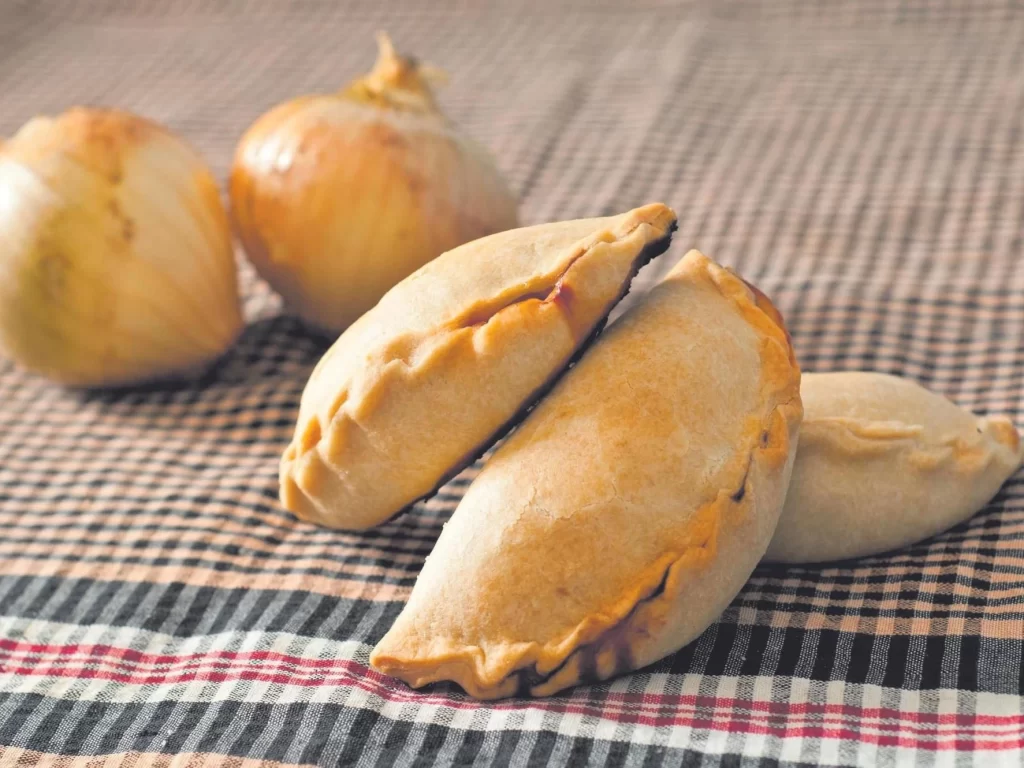
photo by Diario de Mallorca
Frit de Pasqua – A special Easter dish
Unlike the baked goods that can be enjoyed throughout the week, Frit de Pasqua is a dish typically eaten on Easter Sunday. This traditional Easter fry-up consists of lamb offal (or sometimes pork), potatoes, peas, garlic, and herbs, all cooked together in a pan. The dish is packed with flavour and is often served as part of a large Easter lunch with family and friends.
Experience Easter in Mallorca with Food Tours Mallorca
For those who want to truly immerse themselves in Mallorcan cuisine, our self-guided food tours offer an unforgettable way to experience the island’s culinary flavours during Semana Santa. Discover hidden gems, and savour the best of Mallorca’s gastronomy during this special time of year. As it can get busy in the city, restaurants are easily full-booked, but no need to stress, we’ve got it all covered!
Wine & Dine Tour
Join our Wine & Dine Tour to explore the vibrant food scene of Santa Catalina or Palma’s Old Town. You’ll sample good Mallorcan wines, taste carefully hand-picked gourmet dishes, and dine at some of the best hidden-gem restaurants in Palma de Mallorca.
Brunch & Ride Tour
Looking for an active way to enjoy Easter in Mallorca? Our Brunch & Ride Tour lets you glide through stunning landscapes on e-scooters, discovering picturesque villages while indulging in a delicious Mallorcan brunch.
Private Tours
For a more personalised experience, book private tour tailored to your interests. Whether you want to celebrate a special occasion, or simply want to explore Mallorca with friends or family, we are here to give you exactly what you need.
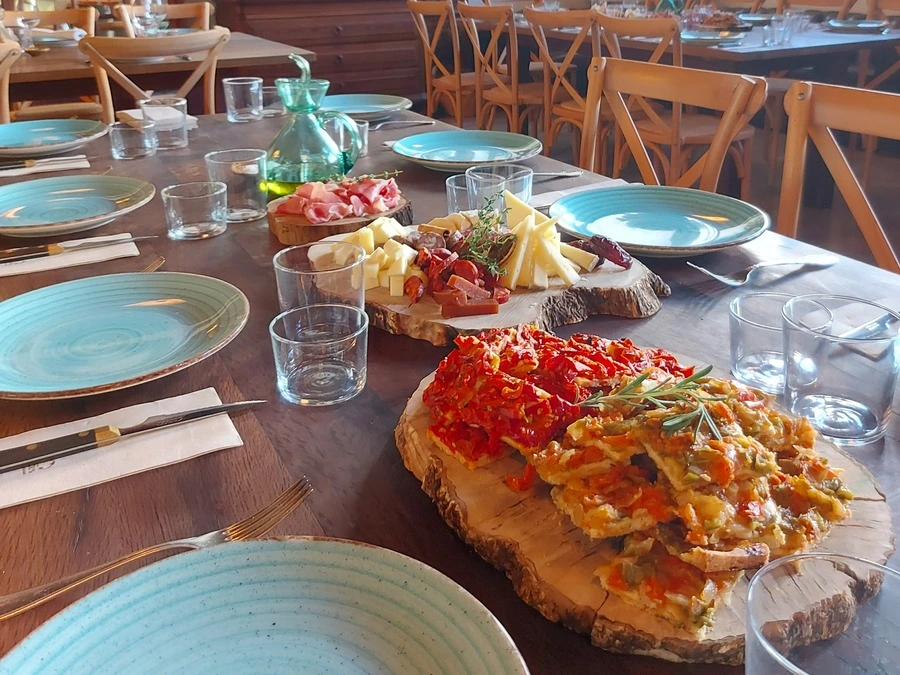
8 tips for visiting Mallorca during Easter
- Plan in advance: Semana Santa is a busy time in Mallorca, so book accommodation and tours early.
- Respect local traditions: Dress modestly at religious events and observe silence during solemn processions.
- Try local specialities: Visit bakeries and markets to sample traditional Mallorcan Easter food.
- Embrace the festivities: Attend both religious and cultural events to fully experience Easter traditions in Mallorca.
- Check the schedule: Processions and events vary by town, so look up timetables in advance to avoid missing key celebrations.
- Be mindful of crowds: Popular processions, like those in Palma, can get very busy – arrive early to get a good spot.
- Learn a few phrases: A simple “Bon dia” (Good day in Catalan) or “Gràcies” (Thank you) can enhance your experience and show respect for the local culture.
- Explore beyond Palma: Towns like Pollença and Sineu have unique Easter traditions worth discovering.
Experience the magic of Easter in Mallorca
Easter in Mallorca is a time of deep tradition, breathtaking processions, and incredible food. Whether you’re here for the Easter parade in Palma de Mallorca, exploring local culture, or indulging in Mallorcan cuisine, Semana Santa in Mallorca is an unforgettable experience. Join us at Food Tours Mallorca to make the most of your visit and discover the very best of Easter traditions in Mallorca.



